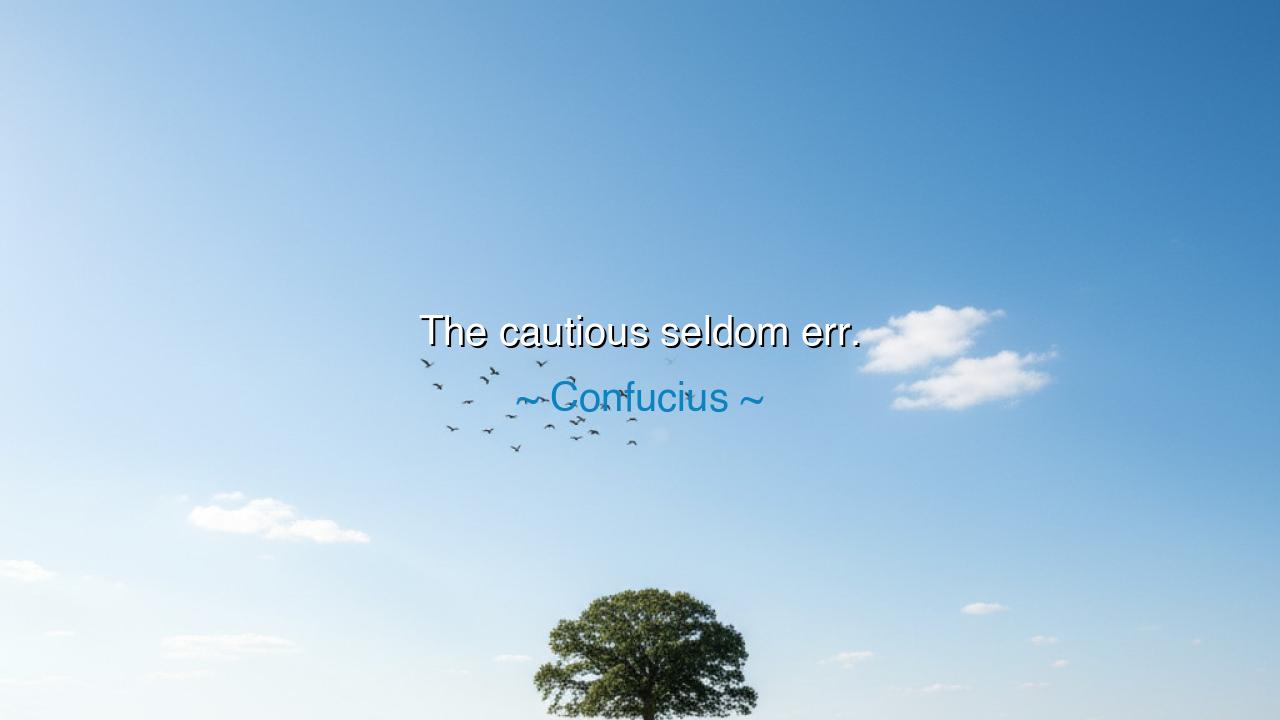
The cautious seldom err.






The sage Confucius once declared, “The cautious seldom err.” In these few words lies a river of wisdom flowing through the centuries. To be cautious is not to be timid, nor to shrink from action; it is to move with care, with clarity, and with foresight. The cautious man does not rush headlong into folly, nor is he tossed about by the winds of impulse. He weighs the consequences, he considers the paths before him, and thus he avoids the grievous errors that consume the reckless. To be cautious is to honor both wisdom and time, to see not only the present flame but the sparks that may yet ignite into fire.
The ancients revered this virtue. In the Analects, Confucius taught his disciples to measure their words, to be slow to anger, and deliberate in judgment. In such restraint lay harmony, and in harmony lay strength. The Greeks, too, honored prudence as one of the cardinal virtues, calling it phronesis—the wisdom of practical judgment. For the man who is cautious seldom stumbles, while the rash man trips even on a smooth road. Caution is not weakness; it is the shield of wisdom that guards against unnecessary wounds.
Consider the tale of Emperor Augustus of Rome. In his youth, he witnessed the bloody chaos that destroyed the Republic. He learned from the impetuousness of others and built his reign upon patience and careful steps. He was known for saying, “Festina lente”—make haste slowly. By being cautious, by balancing boldness with deliberation, he secured peace for decades in what came to be called the Pax Romana. His restraint preserved his power and gave his empire stability. His caution seldom erred, while others, driven by reckless ambition, fell swiftly into ruin.
Yet, history also reveals the folly of ignoring this teaching. Napoleon, in his hunger for conquest, pushed beyond caution into arrogance. He invaded Russia with neither foresight nor humility, and his armies froze in the endless snows. Had he heeded the wisdom of caution, weighing the risks, listening to the counsel of prudence, his empire might have endured longer. The reckless burn bright, but their flames die fast. The cautious, like steady torches, endure through storms.
The meaning of Confucius’ words is both humble and heroic. Humble, because they remind us that restraint, patience, and care are virtues greater than pride and haste. Heroic, because they ask us to discipline ourselves, to master not only our actions but the very impulses of the heart. The world praises boldness, yet it is caution that often preserves life, relationships, and legacies. To act with care is not to act weakly, but to act wisely, knowing that each step may shape not only our own fate but that of many others.
The lesson for us is clear: in moments of decision, do not be driven by impulse or pride. Pause. Weigh your options. Seek counsel. Look to the consequences that may come not only today, but tomorrow and beyond. In such caution lies strength. In such patience lies wisdom. And in wisdom lies victory that does not fade.
The practical action is this: cultivate the habit of reflection. Before you speak, before you decide, before you leap—ask yourself, “What may follow?” Practice caution in your words, for a careless tongue may wound more deeply than a sword. Practice caution in your actions, for a single rash step may alter the course of a life. By such daily mindfulness, you will avoid errors that entrap the reckless and walk a path that endures.
Therefore, O listener, inscribe upon your heart the wisdom of the Master: “The cautious seldom err.” Let your steps be steady, your words measured, your choices guided by foresight. For though the reckless may dazzle for a moment, it is the cautious who build legacies that withstand the test of time.






AAdministratorAdministrator
Welcome, honored guests. Please leave a comment, we will respond soon